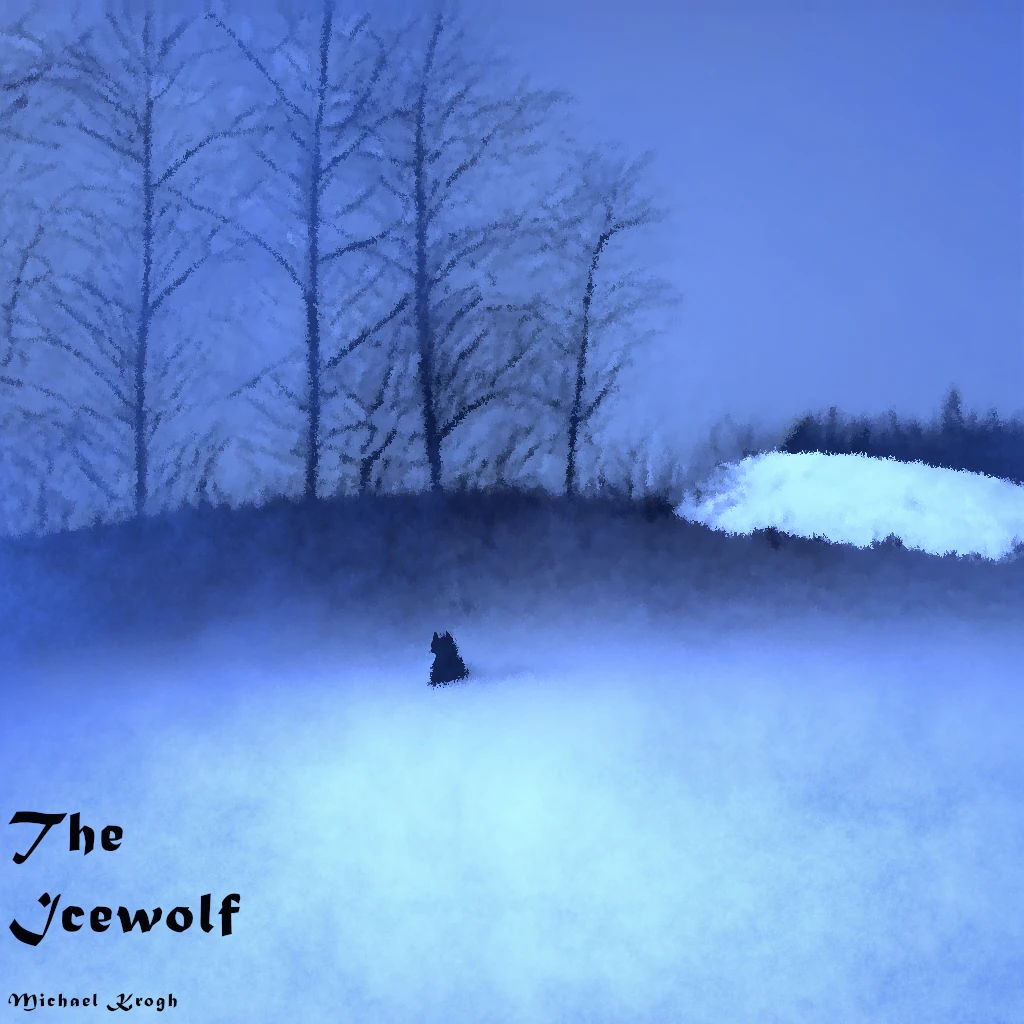Winter is getting nearer, so to bring in that mood, I’m sharing my short story The Icewolf. Perhaps you’ll feel a chill as you read it.

The Icewolf stands at the crest of the hill at the very edge of the treeline, his breath expelling dissipating spirits in the chill of the night. The moon and stars are impossibly bright against the inky black sky like the inside of a speckled and heavenly egg that encloses the world which disappears behind the dark silhouettes of craggy peaks that lie nearly imperceptible upon the distant horizon. His feet rest in deep snow that glows with a preternatural blueness, and even through his shaggy white coat he feels the cold radiating into his body. Wisps of frozen wind blow swirling and sparkling gemstones of frost across the unblemished snowdrifts that lay before him.
He is still. There is prey.
He surveys with sharp eyes and an even sharper nose. Extending away and below him is a snow-driven valley. It is bereft of sound and movement, and as he watches even the wind turns to silence, as if he willed the frozen landscape and everything around it to utter stillness.
The wolf’s ears flick around and he knows the pack is around him. He is the young and strong and smart leader of his clan, the undisputed sovereign of this land, with none to challenge his authority over this harsh and unforgiving kingdom. So too is he harsh and unforgiving, not willfully, but naturally, for that is the predilection of the wolf, of the wild animal. In the ancient wood, in these cold recesses of snow, death’s grip strikes fast and without remorse. Here there are no notions of power except the power in one’s limbs, in one’s jaws, and in that measure of strength he is unrivalled.
Then the prey moves, and so ever so slightly, he moves with it. The pack comes with him, synchronized by instinct as one organism bound by the mutual and primal need for survival, setting aside all lesser and softer emotion in favor of the pursuit.
He sees it. A doe, which he knows from sight and taste but not name, is on the hillside standing alert and as still as a statue, its body half-shaded from the grey moonlight by the trees. It sees him and they both know the true chase will begin in a moment, but in this second they simply study each other with eyes and noses and sights and smells in the stillness of the night.
The wolf is taken by a memory of a chase, where the pounding of his heart had throbbed throughout his body and pulsed with his footfalls as he and his prey wove around the trees and bare patches of ground that spoke of another season, and beyond, past icy cold rivulets of water that cut chasms deep through the deeply fallen snow.
The memory has no context because time has no meaning for the Icewolf. There are only two times for a hunter; times of plenty and times of want, and even a wolf’s mind yearns for those times when the sunlight streaks warmly down through the tree branches as through made of gossamer and bellies are full and coats are short and there is play, contentment and idleness.
Even as he stands watching the doe for any twitch, any sign of movement, he exists in the memory, in the muscle memory of the chase and in the kill. It is a memory recalled by instinct and exists only to lend assistance to this coming pursuit.
The standoff ends. The doe moves and is in an instant a length away from where it had stood, kicking up a spray of the snow which already is cascading back to the ground. But the Icewolf is already in pursuit with the pack behind him as they speed on muffled paws down the side of the hill, predators and prey dark against the shimmering ground. There is no thought now but instinct and the chase and in every moment every muscle is dedicated to the singular purpose of driving these predators towards their quarry.
The scent of the deer is strong and earthy and raw as though the wolf can smell the alarm of the doe which is bolting now through the edge of the trees, and the pack follows and the Icewolf’s memory is still present as he leads them, weaving into the forest. The moonlight is diminished now, blocked by interlaced evergreen branches overhead, and they plunge headlong in near darkness amongst those ageless and mute sentinels.
It is now a test of endurance. The Icewolf is young and strong and gaining on the young doe which nonetheless bolts ahead with an unearthly grace over the hidden rocks and roots of the trees. And the remembrance of blood is in the Icewolf’s head and eyes and he can taste the memory of it upon his tongue which slavers at the thought of once again drinking of it and tasting the flesh it resides in.
They emerge into a clearing, the trees giving way again to pristine skies and ephemeral moonlight and it is apparent that the chase is now near the end, for the wolves are tiring and if the doe makes it to the far edge of the clearing she will escape. Even the Icewolf is straining, heaving great breaths as he plows his chest through the deepening snow just behind the doe, and there is a tinge of panic at the edge of his consciousness that whispers of hunger and death.
The doe turns, just a hair; just a fraction. Unnoticeable. But the wolf sees the movement, and without thinking his body has already moved to intercept, the last stage of a blazing rocket that burns with desperation, and he himself doesn’t even realize it for he’s merely a function of his own instincts now.
He slams into the doe, at once knocking her over and closing his jaws on her neck and so comes the blood and the pack is there, their bodies heaving from the effort of the chase. Their faces are impassive, but their heavy breathing which steams into the air and lolled tongues reveal the effort of the pursuit. He drops the neck of the animal and it slumps, boneless, to the ground. He and the pack stand over the dying beast, watching its remaining life slip away while their own beating hearts take time to subside, to shrink their pulsing until they are again silent in the background.
The snow is stained as the pack eats, the doe’s body nourishing the pack for another day. It is harsh and unforgiving, but not willfully. The doe is nothing anymore; not even prey. Just meat and blood, bone and life. The Icewolf feeds first. He is the emperor, and chooses the best portions, and when he has eaten his fill he yawns and walks on soft padded feet to the far edge of the clearing where the trees do not grow.
Here the snow is receding and there are streaks of frozen brown earth slicing up defiantly through the whiteness, and far across the plain he spies the sparse and yellow lights of a town that crudely mimic the lights of the sky, and the Icewolf does not know it and cannot know it and there is no instinct and there is no memory, and so he turns his attention back to the pack, still feeding from the steaming carcass in the middle of the clearing.
Every morning, more birds return to sing invisibly from the trees. The snow will thaw. And the time will come when the men are back, and he will be nothing more than a wolf again, slinking away with his brethren in the far woods where human eyes do not go.
For now though, his is the expanse of all of the horizon; a kingdom of snow and ice which he is lord over. He runs back through the clearing to the pack, and his is the only sound.
Copyright 2025 Michael Krogh
